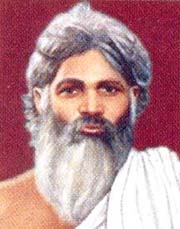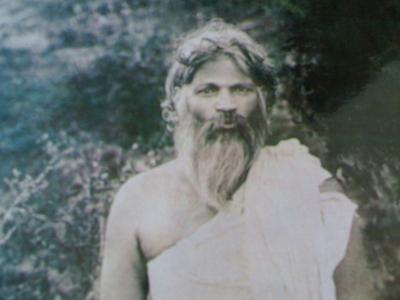Acharya Shri Buddhi Sagar Ji
(1874-1925)
Unending efforts to get knowledge, continuous practices in meditation and creation of spiritual literature-these three meet together like three holy rivers of the Ganges, the Yamuna and the Saraswati in Shri Buddhi Sagar Suriji. He is the great saint and mendicant of this century. He is universally accepted great man of Gujarat.
Birth and Childhood
A religious minded couple strongly believing in non-violence and purely vegetarian was residing at Vijapur town of Mahesana District in Gujarat. Their names were Shivabhai and Ambaben. The couple was well known for their co-operative nature in the whole town. Shivabhai had agricultural land and the family was happy in all respects. A son was born to this couple in 1874, the day of Shivratri on which Lord Shiva is worshipped. He was known as saint Buddhi Sagarji in his later life, but his childhood name was Bahechar. He started his learning at the age of six years in a dusty village-school. He maintained first position up to standard six and was very much loved by his teachers.
Sounds of the future
Every human being is born with deep impressions of his previous births. Bahechar was kind, thoughtful, preferring to stay alone and always ready to serve others. This was his nature since his childhood. At the age of 15 he had saved some Jain mendicants when buffaloes ran after them. At this time he heard the preaching from these Jain mendicants that the beasts also experience pain like human beings if they are beaten and it was a sinful act. He was at once attracted towards Jainism. He used to go to Jain very often to hear the preachings and religious discourses and saints and mendicants. He easily turned to non-violence, forgiveness, broad heartedness, penance renunciation and study of scriptures. He was attracted by high ideas of Jainism. He used to think and meditate. He studied Hindi, English and Sanskrit languages by his own intuition. After sometime he accepted the work of religious teacher at village Ajol. While teaching others, he himself also studied well in religion, history, logic, Yoga and other subjects. He marched on the path of thinking about the absolute and adopted total truth, non-violence. He thought that he would not be able to proceed in studies in this small village and hence he came to Mahesana with the help of Shri Venichandbhai. It was possible here to read and study special books on Sanskrit, Religious-logic and philosophy in large libraries and thereby expand knowledge on all sides.
Acceptance of Renunciation
After sometime, he heard the news of sad demise of his parents and soon he decided to adopt Diksha. At last, he took Diksha in 1901 at Palanpur in the presence of and with the blessings of Shri Sukh Sagarji Maharaj who was the disciple of Shri Ravi Sagarji. Now he became Muni Buddhi Sagar from Bahecharbhai.
Ardent Practitioner of Yoga
From the very beginning of his life he had knowledgeable detachment towards worldly affairs. He strongly believed that spiritual path and practices are the only steps to proceed to the Absolute Truth or Salvation and hence this young mendicant strengthened his practices in meditation. He did not mind to the trifling and unimportant differences in Jainism. He was devoted to high values of very wide Indian culture. He kept himself in loneliness for deeper meditation so that all living beings may get peace on earth and created very simple but high-leveled spiritual literature for common people, which can be read and understood by them very easily. He has, thus, obliged us all very much. He has tried to remove blind faith and unfruitful activities followed out of ignorance in villages and showed the path of true knowledge and high behavior to the uncultured and wandering villagers. He preached the young and the old, the rich and the poor, Jains and non-Jains, men and women without discrimination of caste and creed and showed them the way to true knowledge and salvation.
Practices for spiritual meditation and services to society
After adopting Diksha, he turned to do the works of public welfare after his daily routine deeds of study and religious-rites including meditation. He, therefore, became much popular among the people. Even the rulers of Vadodara, Idar, Mansa, Pethapur etc were impressed by the preachings of Shri Buddhi Sagar Maharaj and they had put up ban on hunting, drinking wine, gambling, violence etc. on certain specified days. They took several vows under the advice of this great saint. The committees of learned awarded him the title of Shashtra Visharad (expert in Scriptures) A mendicant should not stay at one place and accepting this guide-line, Shri Buddhi Sagarji went on moving continuously from place to place and village to village. He was, however, very much attached to three places:
Became Acharya
He was awarded the title of Acharya in 1914 in the presence of hundreds of Jains and many Jain Sanghs. Acharya Shri Buddhi Sagarji was mainly interested in expansion of knowledge and good behavior in society, how to increase self-confidence, create brotherhood and make the people aware of their duties towards their country, community, society, region, animals and the world at large. He had come to Ahmedabad respecting the pressure of Sheth Lallubhai Rayji of Ahmedabad after the monsoon of 1907 and preached many groups of Jains and non-Jains. He held spiritual discourses with Lala Lajpatray, ruler of Limbdi, Collector and Commissioner of Ahmedabad and other little-attached class of people belonging to Hindu, Swami Narayan, Sthanakvasi and Arya Samaj. He cleared off their doubts and explained them the thoughts of Truth, non-violence, renunciation and liberality covering the eternal facts of this and future lives.
Expansion of Spiritual knowledge and service to literature
He established Adhyatma Gnan Prasarak Mandalan institution for expansion of spiritual knowledge of Mansa in 1909 which is the day of special respects for knowledge (Gnan Panchmi) with a view to convey the message and preachings of Lord Mahavir to common people in distant small villages. The institution worked according to its name and has published about 125 great and small books on Gujarati, Hindi, Sanskrit and Madadhi and the special aspects of this series of books are that the books include the subjects of philosophy, history, yoga, spiritual practices like meditation, muttering of holy names, non-speaking, commentaries, translations, biographies, sketches and so on. These books are not for the people of particular or special classes or castes but are meant for the lowest to the highest persons like little learned persons, pleaders, doctors, professors, learned persons, historians, mendicants, renunciators etc. The following books are very much useful to everyone in his daily life and for spiritual development of a real devotee:
His group of disciples
Acharya Shri was mainly interested in creating long lasting books on spiritual knowledge but circumstances lead him to grant Dixa to some advanced souls of this earth. Some of them are:
There have been many impressive mendicants in the tradition of Ajit Sagarji and Kirti Sagarji and the list includes Kailas Sagarji, Subodh Sagarji, Padma Sagarji and others. They have done many good deeds in society particularly in Jain community. The tradition is alive even to day. The holy place Mahudi is very much popular and it is highly developed also. Many saints and mendicants of the tradition of Acharya Shri Buddhi Sagarji are active all over India and working vigorously for the expansion of Jainism by their inspiring and learned lectures, discourses and preachings. There is no doubt that these mendicants will play important part in expanding the spiritual practices and Jain principles even by maintaining secular outlook all around.
Acharya Shri Buddhi Sagarji was like an unending mine of virtues. He had very broad outlook on every subject. He was courageous and adventurous, he could see for the future, he was always active on useful works, constantly meditating, holding deep faith in heard knowledge, by nature he was secular respecting for all religions equally, he was kind and sympathetic, he was free from attachment and greed, sincere in observing rigorous vows, he believed in unity of Jain community, he expanded Jainism by establishing Bharat Jain Maha Gnanalaya (Jain Library) not only among Jains but also among others. He was much tended towards Yoga and meditation and continuously practicized in it.
Old age
He was awarded the title of Acharya in 1914 at Mansa and then after he passed two monsoons at Sanand. He passed all other monsoons in and around Vijapur, Mansa, Pethapur etc. The disease of diabetes held him. In 1924, the famous Dr. Cooper of Anand examined him and concluded that he was suffering from some serious illness. But Acharya Shri was never afraid of death but he arranged that the books pending for publication were published at the earliest.
In 1924, the chief disciple Shri Ajit Sagarji was awarded the title of Acharya, Shri Mahendra Sagarji was made Guni and Shri Riddhi Sagarji was given the title of Pravartak. In this year itself on the second day of bright half of the month of Margshersh the idol of Ghantakarna Veer was established at Mahudi Village near Vijapur, Dist. Mahesana. This would draw the attention of Jains and non-Jains towards religion. He entered the 25th year of his Diksha last year of his life in 1925.
On the eternal journey
Many diseases entered his body one by one after diabetes. After imparting the highest preaching to the political Agent of Padra, Maharaj Shri Buddhi Sagarji came to Mahudi via Mansa, Lodra and Vijapur. He was feeling odd and loneliness after the demise of Maharaj Shri Vriddhi Sagarji in the month of Chaitra, and his own condition also began to worsen but he was determinant to do good and think good of others. The Sangh at Vijapur pressed to carry away the Yogiraj Shri Buddhi Sagarji and he was moved to Vijapur via Pundhara in the early morning by carrying him on a wooden plank. Along with the men of the Sangh, Muni Shri Mahendra Sagarji were continuously in his service. The men and women with him could hear him speaking "Oom Arhat Mahavir" in a very low voice. He was brought to Vijapur in the morning, Acharya Shri Buddhi Sagarji Maharaj breathed his last in the presence of hundreds of his followers and the people of Vijapur and other Sanghs in 1925.

